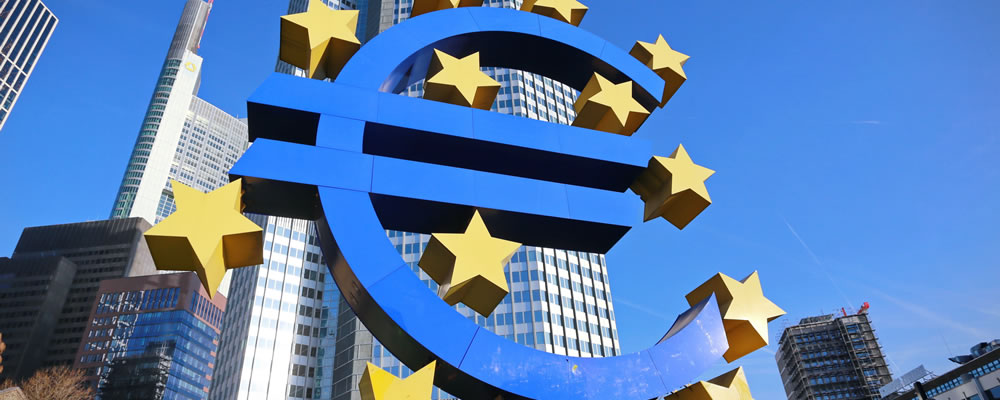Euro to Australian Dollar Exchange Rate Climbs on Stronger Eurozone Data
The Euro to Australian Dollar (EUR/AUD) exchange rate has spent recent sessions tumbling on weak Eurozone data and higher risk-sentiment. However, on Wednesday the pair rebounded slightly and its gains were bolstered by the latest Eurozone ecostats.
After opening this week at the level of 1.5817, EUR/AUD briefly tested a monthly high of 1.5874 before tumbling.
On Wednesday morning EUR/AUD touched on a weekly low of 1.5675, but the pair has since recovered around half a cent and trended closer to the level of 1.5731 at the time of writing.
Demand for the Euro (EUR) rose thanks to some solid Eurozone data on Thursday, as well as mixed movement in the shared currency’s rival the US Dollar (USD).
Mixed market appetite for riskier trade-correlated currencies like the Australian Dollar (AUD) made it a little easier for the shared currency to rise.
Euro (EUR) Exchange Rates Benefit from Signs of Eurozone Factory Resilience
Eurozone factory data in recent months indicated that the currency bloc’s economic activity was being negatively influenced by global trade war jitters, as US trade protectionism worsened and tensions flared up between the US and China.
As a result, investors were pleasantly surprised by Wednesday’s Eurozone industrial production data from October, which beat market expectations year-on-year.
The previous figures were revised a little lower, but the Eurozone’s monthly industrial production print still improved to 0.2% as expected. The yearly print beat 0.7% forecasts and jumped from 0.8% to 1.2%.
Analysts noted that it showed signs of resilience in the Eurozone amid trade fears and their potential influence on the Eurozone economy. The data will likely have a positive influence on the Eurozone’s Q4 growth data.
The data gave the Euro a boost, after the shared currency had been pressured by mixed Eurozone data and fresh concerns about Italy-EU tensions regarding Italy’s budget plans earlier in the week.
Weakness in the US Dollar (USD), which is negatively correlated to the Euro, also supported the shared currency.
Australian Dollar (AUD) Exchange Rates Mixed as Australian Consumer Confidence Edges Higher
After strong performance earlier in the week on hopes for progress in US-China trade negotiations, demand for the Australian Dollar cooled on Wednesday.
The Australian Dollar avoided further losses versus a strengthening Euro thanks to Wednesday’s Australian consumer confidence data from Westpac, which showed confidence improving slightly in December.
The figure edged higher, from 104.3 to 104.4 after a 0.1% confidence change.
Investors had piled into the risky trade-correlated Australian Dollar earlier in the week, on signs that the US and China were still seeing productive negotiations despite last week’s tensions.
As China is Australia’s biggest trade partner, hopes that the US and China could de-escalate trade tensions had made the ‘Aussie’ more appealing.
Euro to Australian Dollar (EUR/AUD) Exchange Rate to be influenced by Central Bank Developments
Thursday could be an influential session for the Euro to Australian Dollar (EUR/AUD) exchange rate and could help the pair extend its recovery.
Major Eurozone news will come in throughout the day, including Consumer Price Index (CPI) inflation data from Germany and France for November, as well as the European Central Bank’s (ECB) anticipated December policy decision.
ECB interest rate hike bets are likely to be in focus throughout the day. Signs of weaker inflation would make investors more hesitant to bet that the bank could hike Eurozone interest rates in 2019.
With 2018 drawing to an end, economists hope the ECB will indicate its plans for monetary policy in 2019. Any signals from the bank that there could be an interest rate hike by Q3 2019 could bolster Euro demand.
The Euro isn’t the only currency likely to be influenced by Central Bank news tomorrow, as the Reserve Bank of Australia (RBA) will be publishing its latest bulletin during the Asian session.
The RBA bulletin may not be as influential as the anticipated ECB policy decision, but this and any shifts in risk-sentiment could still cause some Euro to Australian Dollar (EUR/AUD) exchange rate movement tomorrow.



